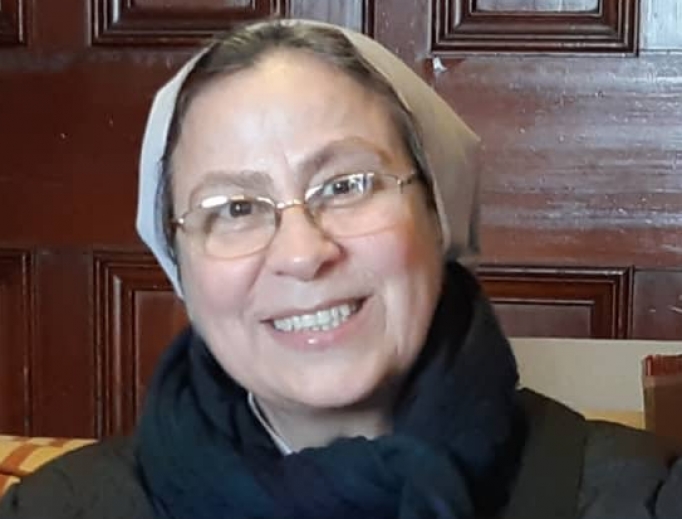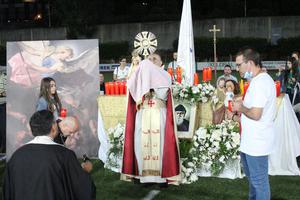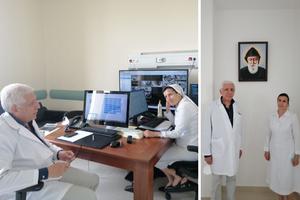‘We Need to Do Something to Give Hope to Our People in Syria’
An interview with Sister Annie Demerjian of the Congregation of the Religious of Jesus and Mary

The city of Aleppo, long known as the industrial capital of Syria, with thousands of factories and workshops, was reduced to demolished buildings and rubble-strewn streets during a bloody siege from 2012 to 2016. Hundreds of people were killed ,and thousands fled the city. Amid Syria’s raging conflict, the sisters of the Congregation of the Religious of Jesus and Mary continued to serve in the country — seven sisters in Aleppo and three in Damascus — despite being granted permission from their provincial to leave if they chose.
For Syrian Sister Annie Demerjian, superior of the order in the Middle East, what really touched her was the determination of the Jesus and Mary sisters from England, who said, “We will not leave” Syria. Sister Annie recognized their commitment as a sign of a mission-focused heart.
In Aleppo, like the people they served, the sisters experienced bombings and lack of basic necessities, including water and electricity. Students in their school diligently continued studies within earshot of sniper fire. In visits to suffering, grieving families, Sister Annie encountered a deep faith among people who could still say, “Thanks be to God,” despite all they had endured.
The suffering continues. International sanctions have “paralyzed” the life in Syria for ordinary people who face economic hardship, Sister Annie says. And there is a great need for the healing of hearts and inner wounds of Syrians traumatized by the war.
The Congregation of the Religious of Jesus and Mary was founded in Lyon, France, in 1818 by St. Claudine Thévenet, canonized by Pope John Paul II in 1993. The order is present in 28 countries in four continents. Its presence in Syria began in 1983 and in Lebanon in 1963.
From the convent of Jesus and Mary in Rabweh, Lebanon, where she was visiting from Syria in her role as superior, Sister Annie shared with the Register the trials of the war and the need for hope and healing for the people of Syria.
What did you experience during the war?
It was very painful days we went through. We [sisters] lived exactly what the people experienced: no water, no electricity, no basics of daily living. We had bombs many times near us and windows broken. We were shivering in the night with no heat; it was very cold.
In Aleppo, we continued with our school, but, also, we started helping our people, visiting families.
And people helped each other. I remember we had a friend who visited us with one eggplant, one zucchini and one cucumber. She said, “My brother bought this for my parents, and we want to share with you.” For us, we shared the suffering, but we also shared the good together — and, always, we experienced what our foundress, St. Claudine Thévenet, used to say, “God will provide.” Many things happened during the war, and we said, “God is really providing.” We just need to trust him and depend on him.
In 2012 we stopped classes at our school, which is a 20-minute drive outside of Aleppo, because snipers were around the school. It became very dangerous for the children. So we shared a government school, which held classes in the morning; and our students attended in the afternoon, from noon to 4:30, to at least continue with the main subjects.
It is amazing how children adapt to the situation. At 4pm in the winter, when it was becoming dark, the students would take out their flashlights and continue their studies, even the 4- and 5-year-old children. You look at them and say, “How great they are.”
One time, I was supervising young people, grades 10 and 11. It was exam time. We could hear that snipers had reached the alley. I asked the students to move away from the windows. Most of them sat on the floor, and they continued writing their exams. No panicking, nothing. I was brought to tears, telling them, “You are the heroes of our time.”
Maybe nobody knows how much they endured these days, our young people, but, really, they gave us a lesson in how to survive.
Not just in Aleppo, but in some parts of Syria, some schools were used for sheltering refugees; others were controlled by the rebels for different purposes. There were 1,500 students in our school, about 17% Muslim, but during the war the enrollment became less and less, until we had less than half. So many families left.
Our school needs time to be repaired from the bombs. Of course we lost lots of good teachers because they fled the area. We believe education is one of the important things to rebuild the minds and the hearts, the way of thinking.
What was the level of people’s faith in Syria?
What touched me a lot, when we went to visit people, they would continue to say, “Thanks be to God.” For me, it’s a big message, how they persevere, how they are determined to continue in spite of everything — how they are carrying this suffering with a “Thanks be to God.” Some people would ask, “Why, God?” and that’s normal with a great suffering, especially those who lost their children, or members of their families.
Many people still went to the churches, even when there was bombing. Sometimes a church had been hit many times, and we would think, nobody will come to the church. The next day, you would find people going there to pray, despite the damage. We have so many different churches in Aleppo: Latin [Rite], Maronite Catholic, Greek Catholic, Syriac Catholic, Armenian Catholic, Chaldean Catholic, Armenian Orthodox, Syriac Orthodox, Greek Orthodox, evangelical.
I consider Aleppo to be well-known for lots of activities in the Church, so full of life, with people active with all kinds of missions and group meetings, catechism, scout groups. That didn’t really stop, but it wasn’t like it was before. All the churches did their best during the war. It was amazing how they continued.
There was, and is, a big collaboration among the churches: a great example of ecumenism.
Some churches that were near the conflict areas were completely damaged. Some churches were damaged greatly from the bombs and shells, but now they are repaired, and life came back to the church.
What effect did the war have on the Christian population?
What I know is that Christians in Aleppo numbered 150,000 to 200,000 before the war, and that number has been reduced to about 32,000.
Every time you say goodbye to a family, it’s not easy. They left their history, they left their belongings, their land, their house, their relatives, memories, friends. Some left their mothers and fathers, who sacrificed and told their children, “Go. Don’t worry about us.”
Some could go, some could not, so they just encouraged their children to leave, to find a safe place either inside Syria or abroad.
How is the situation now, in terms of security?
For most of the places in Syria, concerning security, it’s much better. In some parts, there are still conflicts going on between our army and the rebels, in the north and northeast.
Before the war, we lived a very peaceful life in Syria. People lived side by side as brothers and sisters. We never questioned whether someone was Muslim or Christian. We knew them as our neighbors. During our Christian feasts they would visit us, and we would do the same [for their feasts]. We were living together in a really peaceful way. This concept of [categorizing as] Muslim, Christian, Shia, Sunni — I never experienced that before, not until during the war. It’s very painful. We are human in the end. We believe in one God.
In the rebel-controlled places it was very hard for the Christians to live with the Muslims, not because our brothers do not want to live together, but the life was affected by the rebels who imposed certain criteria or mindsets. There was a family who lived in Raqqa, Syria, which was controlled by ISIS. This Christian man needed the help of a Muslim. The person who was managing ISIS said to the Muslim, “You must not help; he’s a kafar [infidel].” The [Muslim] man replied, “He’s our neighbor.” But he was told by the ISIS official that he must not help the Christian. This Christian family had been paying the jizya [a tax imposed on all non-Muslims]. The next year, they couldn’t pay the jizya, and the [Christian] man was beaten and treated very badly. Later on, he found a way to run away with his family to Aleppo.
In some parts controlled by the rebels, the Christians are living in a bad situation. In other parts, we are living together in peace.
Really, it’s a pity what happened to Syria. We had our freedom. Churches are free to celebrate. Scouts [youth groups who are typically affiliated with a church] go out on the streets for certain feasts. We never felt that there was no freedom to practice our faith.
What are the needs now?
There is so much suffering.
Now, with the economic crisis, people are saying, during the war we were able to eat a little bit. Now it’s very hard times for us. The [international] sanctions, which are imposed on Syria affect the ordinary people. The sanctions paralyzed the life of Syria. Everything.
In Aleppo, more than 200 factories were destroyed during the war. Restoring them and getting them to function needs years. Thousands of people are without jobs. The lack of electricity, lack of income has affected people terribly. For those who work, the income is not enough for an ordinary family to live in dignity. And everything has become more expensive. A great majority of people who stayed in Aleppo are elderly and have no income.
Things are so heavy on the people. I always think about the West, and how they speak of human rights and human dignity, and at the same time they are imposing sanctions on us. What are they doing? Why do they want to harm the people of Syria? The sanctions, let us be honest, it’s the ordinary people who are suffering from it.
Can you imagine, if someone will interfere in your country? If they don’t accept it [interference] to their country, how will we accept it to our country? And many are interfering. We need to do something.
So I always pray for the leaders in the West that the Lord will give them the wisdom to be a real instrument for peace in Syria, and not just in Syria but the whole world.
What can Christians in the West do?
First of all, when I’m talking about the West, I’m referring to government leaders.
I’ve met many people in the West who are concerned about their brothers and sisters, really, who are thoughtful about us. Without them, I don’t know what would happen to our people in Syria. That, for me, is a great thing, to think about our brothers and sisters all over the world praying, helping with all kinds of needs. Sometimes a message helps; sometimes a prayer. And sometimes they help financially.
What always comes to my mind is St. Paul, when he says: “If one part of the body suffers, all the other parts suffer with it.” We can’t just say, “It has nothing to do with me, miles away.” No. Disease can go all over the Body of Christ. So we need to be careful.
I want to thank all the people who, with good hearts, try to help and those who are carrying us with prayers. Most importantly, at least we know someone is praying for us and is concerned about us.
How did you keep your strength during the trying times of the war?
I don’t know how many times I’ve been asked this question. Two things helped us, together as sisters: prayer and being together, helping each other, standing by each other — that’s a very strong point.
I remember when the times were very, very hard in Aleppo and there was no electricity. Okay, you get used to that. We have just one and a half hours a day of electricity.
We used to wake up at 6am, going to the chapel, a candle in our hand and the [Divine] Office in another hand, and we continued. Life means to continue.
During the night when there were big bombs we would come out of our rooms and go to a safe room. Sometimes we would just sit together and pray, sometimes each one praying in silence. I always recalled this image, when Jesus was on the cross, saying, “Why have you forsaken me?” I always think, in God’s silence, he’s suffering for us and suffering with us. God is here with us.
What is needed for healing among the Syrian people?
I always describe our people as like a person who has had a massive operation. Healing always needs time. To heal their memory, their heart, their wounds, it’s not easy. Of course we need lots of work in trauma healing, psychological support, especially for those who have experienced great trauma — women, children and men.
They need accompaniment, someone to listen to them, to be there. The spiritual help, prayer, really does a good job to heal the wounds of a person.
We, the Sisters of Jesus and Mary, recently had different courses in different parts of Syria.
In Damascus, we opened the Blessed Dina Bélanger Center [named for the Jesus and Mary sister, beatified in 1993\, offering healing through music and art for children. We have hundreds of children coming to this center. We believe this is one way we can help our children to take all the tension, the memories, of what they heard these past 10 years. They heard the sounds of rockets, bombs, and now we want them to really hear music, which can heal their hearts and souls.
We also have the Hope Center in Damascus, in which we try to reach women and young people; we try to support them with health-care awareness and psychological care. Through the Hope Center, we also help them find jobs.
In Aleppo we have young people who also established a Hope Center. They are trying to help the community find jobs. About 18 young people at the Hope Center in Aleppo have decided to stay. They are doing really amazing work. More than 200 families have found jobs, in the past two years. They have also established a somewhat comfortable space for university students to study, with electricity and heating. And we have opened another center to help young people after university to develop their personal skills and [offer assistance on] how to find a job. In Aleppo, we try to help with a small jeans factory, with more than 17 young people working there.
This is the way the hope is coming: like a puzzle, each one putting a piece of this beautiful picture to build again the wide picture of Syria. We need to do something to give hope to our people. To make them feel that there is a future. That we can build our country.
If we go back to St. Claudine Thévenet, our foundress, she lived during the French Revolution; and our time is similar to her time, with the suffering, the killing and destroying of the life and dignity of the people. She saw her two brothers killed. Just before they died, they sent a message to her saying, “Gladly forgive as we are forgiven.”
That’s what we need today: reconciliation, healing and forgiveness; for people to know that God is love, God is mercy, God is forgiveness.
How can people help financially?
We work a lot with Aid to the Church in Need (ACN) and other organizations, such as L’Œuvre d’Orient in France and Caritas, as well as other organizations working in Syria. So they can contact these organizations. ACN in particular is well-known.
Register correspondent Doreen Abi Raad writes from Beirut, Lebanon.

















